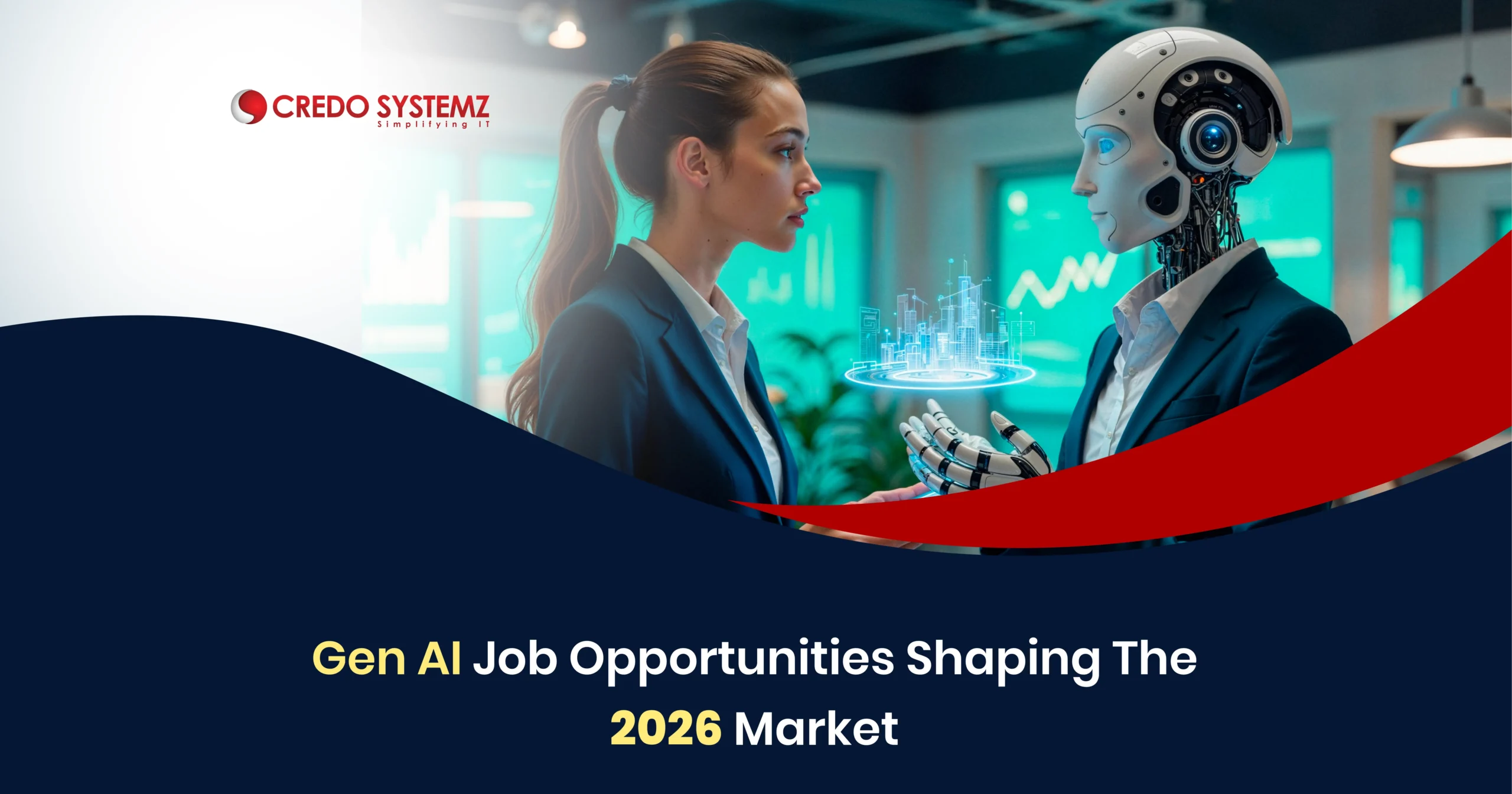
Gen AI Job Opportunities Shaping the 2026 Market
Generative AI is a labor-market force as companies embed generative models into their products and operations. It is reshaping the job roles, skills and hiring strategies worldwide. By 2026 we’ll see new specialist positions like LLM engineers, prompt engineers, LLMops and a broad re-skilling wave across product, compliance and domain teams.
Quick market snapshot
The demand for generative-AI skills is exploding with unique job postings. The specialized job roles like “Generative AI Engineer” are appearing regularly in listings.
Major global reports show AI will automate tasks and create new roles as well. Overall forecasts point to large-scale labor shifts with net new job creation in AI-enabled functions balanced against displacement in automatable tasks.
Want to know more about the course curriculum, career counseling, or video references? Just ping us on WhatsApp!
Top job categories to watch (2026)
Big tech, AI startups, enterprise software firms, and an increasing set of non-tech companies in finance, healthcare, manufacturing and media are hiring Gen AI professionals. The top AI job roles that are expected to be available by 2026 are:
- LLM / Generative AI Engineers
- MLOps / LLMops Engineers
- Prompt Engineers & AI Application Builders
- AI Product Managers & Designers
- AI Governance, Ethics & Safety Leads
- Data & Annotation Specialists
- Domain AI Specialists
Join our exclusive WhatsApp group to get instant updates on career trends, training programs, and in-demand skills.
👉 Join here: Click to Join
LLM / Generative AI Engineers: To build, fine-tune and deploy large models (or integrate hosted LLMs) with skills, such as:
- PyTorch/TensorFlow
- Prompt tuning
- RAG (retrieval-augmented generation)
- Model evaluation & safety
MLOps / LLMops Engineers: Developing production-ready models with observability, cost control, continuous deployment, monitoring for data drift and hallucinations.
Prompt Engineers & AI Application Builders: Design prompt flows, system messages, and prompt-based evaluation harnesses.
AI Product Managers & Designers: Understands model capabilities/limitations and designs valuable user experiences with LLMs.
AI Governance, Ethics & Safety Leads: Are responsible for policy, risk assessment, bias audits and regulatory compliance.
Data & Annotation Specialists, Synthetic Data Engineers: Focus on high-quality data, labeling pipelines, and synthetic data generation.
Domain AI Specialists (Healthcare AI, Finance AI, Legal AI): Domain expertise + generative AI skillset to build compliant, high-value systems for sensitive verticals.
How to prepare for Gen AI job opportunities— practical roadmap
To gain the generative AI skills, the core technical foundation to be focused on are Python, ML fundamentals, transformers, RAG, vector databases.
Learn about Tooling & infra such as Docker, Kubernetes, MLflow, Seldon/Vertex/AWS SageMaker, monitoring & cost optimisation.
Gain hands-on experience by building projects like RAG apps, fine-tune a model, deploy an LLM inference endpoint with observability.
Develop the Soft & product skills such as Prompt design, prompt evaluation frameworks, A/B testing for outputs and domain knowledge.
Learn safety and governance that includes model evaluation metrics, bias detection, explainability tooling, and basic AI law/reg compliance concepts.
Join Credo Systemz Gen AI training in Chennai to master the knowledge and skills of Gen AI using professional experts.
Final takeaway
By 2026, generative AI will have matured from experimentation to industrial adoption for many firms. This transition creates a two-track market: technical specialists who build LLM systems, and cross-functional professionals who embed AI safely into products and business processes. If you’re aiming to ride this wave, combine hands-on LLM experience with production skills (MLOps) and domain knowledge.

Join Credo Systemz Software Courses in Chennai at Credo Systemz OMR, Credo Systemz Velachery to kick-start or uplift your career path.
Gen AI Job Opportunities – FAQ 2026
Yes. The role has evolved beyond just writing prompts. Today, prompt engineers work on:
- System design
- Evaluation of AI outputs
- Optimization of workflows
No. Instead, organizations are creating:
- Task-oriented entry-level roles
- AI-adjacent positions with human oversight
- Evaluation and governance functions
The highest ROI comes from mastering:
- MLOps / LLMOps
- Deploying safe production systems
- Moving models from prototype to reliable services
Non-technical professionals should build:
- Domain expertise + AI literacy
- Product management skills
- Evaluation metrics & prompt strategy
- Working knowledge of model limitations
Yes. Growing areas include:
- Compliance
- Privacy and data governance
- Model audit & Responsible AI functions
